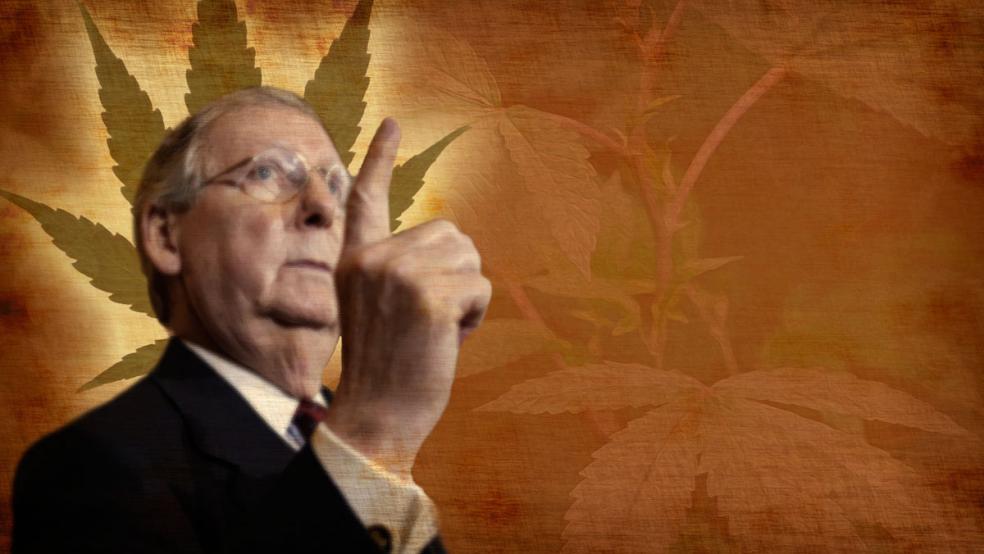Facing a dangerous Democratic challenger in his November re-election, Kentucky Sen. Mitch McConnell, the Republican leader in the Senate, has been dedicating slightly less time to making life hell for Majority Leader Harry Reid (D-NV) and slightly more to issues specific to the Bluegrass State.
McConnell has recently given high-profile talks in Kentucky about combating the growing problem of heroin addiction in the northern part of the state. And this week he touted his success in passing a bill in the Senate that blocks the federal government from restricting fishing on parts of the Cumberland River.
Related: This Could Be Mitch McConnell’s Last Hurrah
Few of his home state projects are as interesting, though, as his battle with the Drug Enforcement Agency. The DEA impounded 250 pounds of industrial hemp seeds at the Louisville airport before the seeds could be delivered to the Kentucky Department of Agriculture and several state universities.
The fight ended yesterday, with the DEA backing down, but the backstory to McConnell’s unlikely advocacy for a Schedule 1 controlled substance is worth a closer look.
Hemp is a remarkably versatile plant. Its seeds can be used to produce various kinds of foods, oils, and biodegradable plastics. Its fibers are used to make rope, clothing, paper, and other products. And it is well-suited for cultivation in Kentucky – a state that has lost a lot of money and jobs because of declining tobacco production.
The problem is that the industrial hemp plant has a more famous relative: marijuana. Both belong to the cannabis sativa species. But while smoking marijuana will get you high, smoking industrial hemp will get you – well, a lungful of smoke and not much else. Industrial hemp – cultivated for thousands of years – has such a small amount of marijuana’s psychoactive agent tetrahydrocannabinol (THC) that it is useless as a recreational drug.
That didn’t stop the DEA, however, from classifying industrial hemp as a Schedule 1 controlled substance, putting a crop commonly cultivated around the world into the same category as heroin, LSD, and ecstasy.
Related: How the Tea Party Is Winning … by Losing
McConnell successfully sponsored legislation as part of the omnibus farm bill earlier this year that allowed hemp cultivation pilot programs in Kentucky which, theoretically, at least, exempted hemp grown under its auspices from the Controlled Substances Act. The DEA, though, seems to have missed the memo. The agency confiscated 250 pounds of seeds bound for various pilot project sites earlier this year, and as the planting season drags on, it’s becoming increasingly urgent for the seeds to get in the ground so a crop can be delivered this year.
As recently as Wednesday, when McConnell met with DEA administrator Michele Leonhart, the agency didn’t seem to be budging.
“I again expressed my frustration that the DEA is using its finite resources to stymie plainly lawful hemp pilot projects at the very time Kentucky is facing growing threats from heroin addiction and other drug abuse, and I called on the DEA administrator to release the industrial hemp seeds so that Kentucky can begin its pilot program,” McConnell said in a statement.
“I also stressed that as the author of the industrial hemp provision, the intent of this provision is to allow states departments of agriculture and universities to explore the commercial use of industrial hemp as a means for job creation and economic development,” he said. “The language expressly exempts hemp from federal regulation for these defined purposes.”
Related: The Real Power of a Tea Party Centrist - Winning
On Thursday night, news broke that the DEA had backed down and issued the Kentucky Agriculture Department a permit to import the seeds. Planting is expected to begin shortly.
It’s unlikely that McConnell will start playing Bob Marley songs at his campaign rallies – but his efforts to launch the pilot program in his home state have not gone unnoticed by people who aren’t usually appreciative of the efforts of the very conservative Republican.
It’s not every day, after all, that the cannabis-focused website, The Daily Chronic, runs headlines celebrating McConnell’s stance on an issue.
Top Reads from The Fiscal Times:





